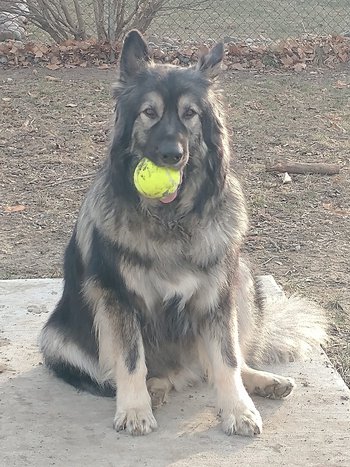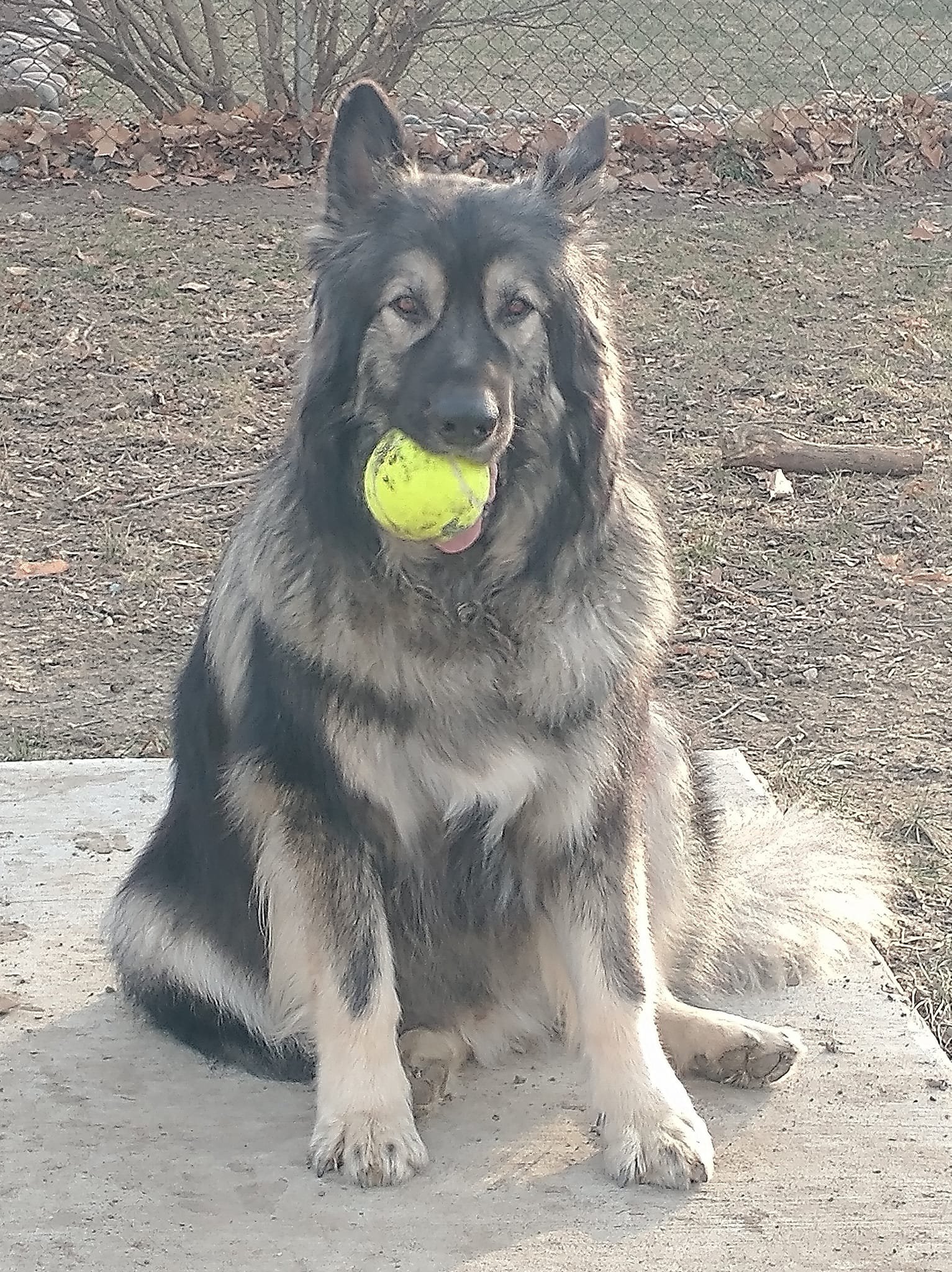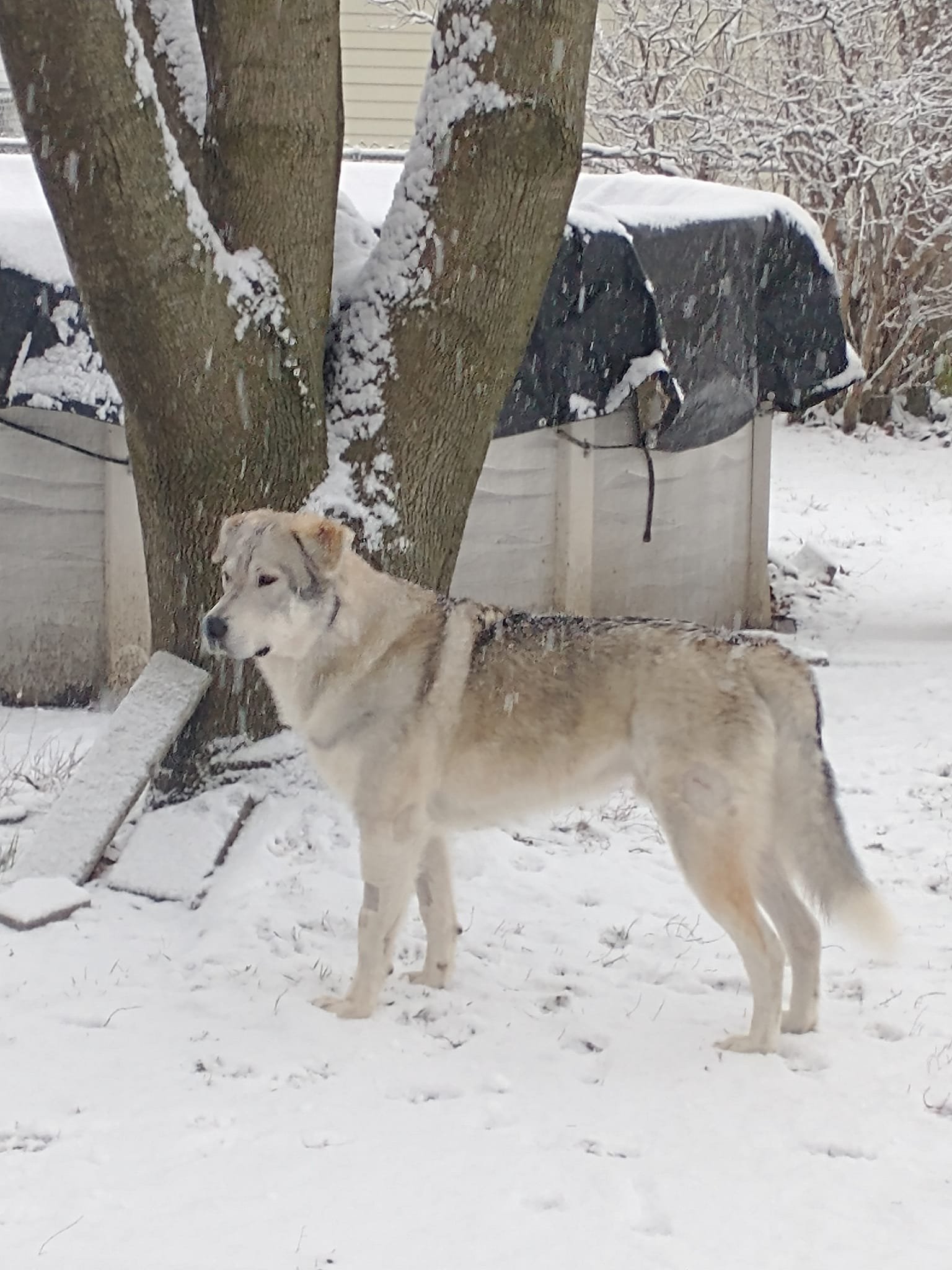A dog trainer's review of two DireWolf Dogs
By Jennifer Stoeckl, MAT - Dire Wolf Project CEO, Sept. 21, 2023
Most dog trainers learn to train working dogs.
This makes sense because…
the vast majority of dog breeds in the world today are working dog breeds.
Even world renowned dog trainer Michael Ellis is paraphrased as saying that dogs without drive are best suited as family pets.
A K9 Safety Consultants dog trainer from Detroit, Michigan agrees.
Jody-Lynn has taken both of her dogs, Hercules and Finnegan, to this traditional dog training facility, so this trainer has a unique perspective of her two different types of dogs.
I will briefly describe Hercules and Finnegan below and then post the trainer’s assessment.
Hercules is a second generation away from a giant Alaskan Malamute cross with many features of the working breed. He is outgoing, friendly, confident and independent. He has a mind of his own, but with training has really come around. He can be goofy and play rough with other dogs, disregarding boundaries and getting himself in trouble many times at the dog park. He can be macho and domineering with other dogs… not aggressive, just overwhelming. He doesn’t have a good sense of his giant size and how much space he takes up. But he always means well and is a willing participant if the rewards outweigh his desires.
Finnegan is a fourth generation American Dirus dog and apart from his overall lack of confidence, he fits the American Dirus dog’s temperament standards to a T. Finnegan is very gentle, emotionally sensitive, quiet, calm-minded, aloof to strangers, and bonded. He does have an inherited lack of confidence according to our ideal temperament standards, but he did not show fearful behaviors until after his bone break accident at around 8 months old. Finnegan is extremely smart, but isn’t quick to comply. He takes a good amount of wait time to process new tasks and is not food motivated. He has an even temperament and doesn’t show over excitement or happiness in an outward way.
Here is what a K9 Consultants trainer had to say about the differences between them:
Dire-wolf Observations.
I've made some observations on regards to Finnegan and Hercules, the two dire-wolf dogs that attend training here, at K-9 Safety Consultants. Both dogs do well FOR THE HANDLER. Some things I've noticed; the dogs are polar opposites. Hercules does not "lack" in sociability/socialization. I think this is great for a service dog. You can most absolutely teach a dog to be reserved, rather than breed for it. Finnegan, on the other hand, shows no interest in human contact. TOO RESERVED(for the most part, if Hercules is getting attention, Finnegan will join in.) Too much "shyness" can create a dog that is overly fearful, can cause problems, Finnegan is also very stubborn, whereas Hercules aims to please the handler. I would aim to produce/promote a dog like "Hercules" every day of the week. Loyal, social when allowed, confident around people. Beautiful temperament and easy trainibility. This makes the service dog training, and, overall quality of life with the dog, more convenient.
First of all…
It is important for you to know that the above assessment is TYPICAL of dog trainers who do not know our breed.
Which is 99.99% of dog trainers.
Secondly…
It is important for you to know that the American Dirus dog is NOT a working dog breed.
Instead, we breed strictly for a large breed companion dog temperament.
That means, from a dog trainer’s perspective, an American Dirus dog will lack motivation and drive. Also, an American Dirus dog will require significant wait time to comply (many misinterpret this as stubbornness, it is not). Lastly, an American Dirus dog is aloof to strangers, strongly bonded to their owners. This is the “companion” part of the equation. When a dog is an equal friend to all, it is no longer a family companion dog, but a global companion dog.
The trainer above is correct… the type of dog breed typically chosen for assistance dog work is the exact opposite of Finnegan.
We once had a dog trainer from Texas yell at Lois on the phone calling her names because she was adamant that only a certain type of temperament was the “right” kind of dog to be a “good” service dog.
There are service dog “purists” out there informing the masses that ONLY the “FAB FOUR” dog breeds are worthy of being service dogs.
They state this because these four breeds: Golden Retriever, Labrador Retriever, Poodle, or Collie, have the so-called “correct” personality to serve as assistance dogs.
These dogs are typically outgoing, energetic, smart, and willing to work. They instinctively run after moving objects, so they have high drive and are also typically highly food motivated.
AND…
I do NOT deny this.
Most often, a dog with the above innate abilities and personality is the type to choose for most assistance dog work.
That being said…
Some of our owners have noticed something phenomenal.
Yes… good training can calm a high-energy, high-drive dog over time.
But…
Good training can also socialize and build confidence in an already calm, sensitive dog.
What you CANNOT teach a dog is
the devotion and intuitiveness
that comes from an innate sensitivity
toward human emotion.
That has to be there in a dog from the beginning.
And, it is only present in a dog that can pay attention, has strong intelligence, and is calm and bonded enough to its human partner to attend.
Of course, other dog breeds have dogs within their breeds who possess this specific combination of traits.
It certainly exists outside of the Dire Wolf Project. That is how Lois captured and built it into her own dog breed.
But until now there has never been an entire dog breed that has this natural tendency with these specific set of traits in the majority of dogs.
So, while Dire Wolf Project breeders do NOT breed working dogs, some American Dirus owners have noticed this incredible set of temperament traits and have been able to achieve amazing things.
Their dogs naturally:
- give deep-pressure therapy, placing heartbeat next to heartbeat.
- step in front of or behind their owners while waiting in line, a form of blocking.
- wake them from nightmares, reducing frequency and severity.
- disrupt panic attacks, attending to the individual with consistent care.
Results will vary, as with anything, especially a living thing, but with the right kind of training, a highly emotionally sensitive, calm, devoted, introverted dog can achieve what is much harder to train for in a working dog breed that must first learn to calm its mind and attend.
Working breeds trained as PTSD service dogs perform these behaviors from rote memory… our large breed family companion dog breed performs these behaviors innately, as a matter of natural emotional response.
The difference is profound.
Finnegan is hands down more in touch with his owner’s emotional state than Hercules. He is more able to emotionally attend when his mommy has a bad day.
While his lack of confidence needs work, Finnegan is a regal kind-hearted beast ready to come to his mommy’s aid if she should ever require it.
He is a heart dog.
The dog of a lifetime.
The one that can never be forgotten nor be replaced.
And while the trainer sees the reluctance to perform and the fear of a little toy mouse, his mommy sees his devoted caring soul bound together by a thin golden thread made of a special ingredient that isn’t mass produced.
It had been created out of the love and devotion of one woman who gave her very life to the pursuit of a dream to produce the world’s first large breed companion dog and her daughter who now carries it to you.
This dog trainer illustrates the very reason why I have come to realize how necessary it is for me to write and film the “Canine Culture Shock” dog training series.
I resisted for years because there are already many very fine dog training programs out there on the Interwebs that can teach what it takes to train our more sensitive dog breed.
But that’s the entire problem!
There are TOO MANY dog training facilities touting all kinds of different training philosophies and the confusion is real.
Many programs are just like the one above with a bias toward the outgoing working dog… and I don’t blame them.
Now, though, we should specifically address a training series specifically designed for our special, more sensitive dog breed.
Our dogs don’t need to be poked, prodded, or treated to oblivion.
They need understanding, time, and patience.
Therefore, I now realize it is time for someone to provide an easy way to understand and train a gentle companion dog… or any calm, sensitive dog from any other breed that doesn’t happen fit its working standard.
Over the winter and into next spring, I will be diligently working on writing the book and putting together the video footage for the Canine Culture Shock series.
Then there will not be any more confusion on where to go to gather the information you need to train our special type of dog.
Here is the link to find out more about what the series will entail:
https://direwolfproject.com/direwolf-publishing/coming-soon1/canine-culture-shock/
Jennifer Stoeckl is the co-founder of the Dire Wolf Project, founder of the DireWolf Guardians American Dirus Dog Training Program, and owner/operator of DireWolf Dogs of Vallecito. She lives in the beautiful inland northwest among the Ponderosa pine forests with her pack of American Dirus dogs.

